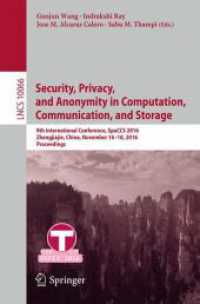- ホーム
- > 洋書
- > 英文書
- > History / World
Full Description
These essays examine how various communities remembered and commemorated their shared past through the lens of utopia and its corollary, dystopia, providing a framework for the reinterpretation of rapidly changing religious, cultural, and political realities of the turbulent period from 300 to 750 CE.
The common theme of the chapters is the utopian ideals of religious groups, whether these are inscribed on the body, on the landscape, in texts, or on other cultural objects. The volume is the first to apply this conceptual framework to Late Antiquity, when historically significant conflicts arose between the adherents of four major religious identities: Greaco-Roman 'pagans', newly dominant Christians; diaspora Jews, who were more or less persecuted, depending on the current regime; and the emerging religion and power of Islam. Late Antiquity was thus a period when dystopian realities competed with memories of a mythical Golden Age, variously conceived according to the religious identity of the group. The contributors come from a range of disciplines, including cultural studies, religious studies, ancient history, and art history, and employ both theoretical and empirical approaches. This volume is unique in the range of evidence it draws upon, both visual and textual, to support the basic argument that utopia in Late Antiquity, whether conceived spiritually, artistically, or politically, was a place of the past but also of the future, even of the afterlife.
Memories of Utopia will be of interest to historians, archaeologists, and art historians of the later Roman Empire, and those working on religion in Late Antiquity and Byzantium.
Contents
Part I: Writing and rewriting the history of conflicts 1. Curating the past: The retrieval of historical memories and utopian ideals 2. Julian's Cynics: Remembering for future purposes 3. Memories of trauma and the formation of an early Christian identity 4. Augustine's memory of the 411 confrontation with Emeritus of Cherchell Part II: Forging a new utopia: Holy bodies and holy places 5. Purity and the rewriting of memory: Revisiting Julian's disgust for the Christian worship of corpses and its consequences 6. Constructing the sacred in Late Antiquity: Jerome as a guide to Christian identity 7. Utopia, body, and pastness in John Chrysostom Part III: Rewriting landscapes: Creating new memories of the past 8. Memories of peace and violence in the late-antique West 9. Two foreign saints in Palestine: Responses to religious conflict in the fifth to seventh centuries 10. Remembering the damned: Byzantine liturgical hymns as instruments of religious polemics 11. Paradise regained? Utopias of deliverance in seventh-century apocalyptic discourse 12. Ausonius, Fortunatus, and the ruins of the Moselle Part IV: Memory and materiality 13. Spitting on statues and saving Hercules's beard: The conflict over images (and idols) in early Christianity 14. Athena, patroness of the marketplace: From Athens to Constantinople 15. Transformation of Mediterranean ritual spaces up to the early Arab conquests Epilogue








